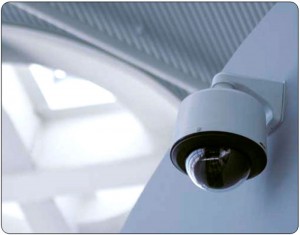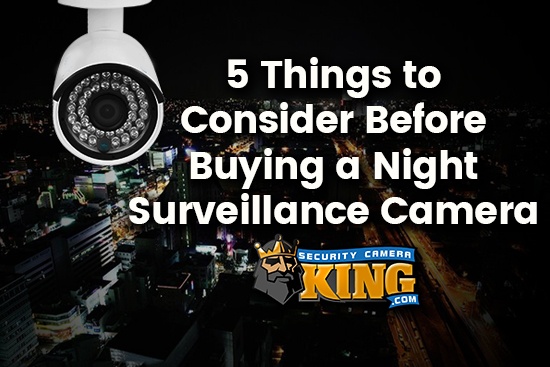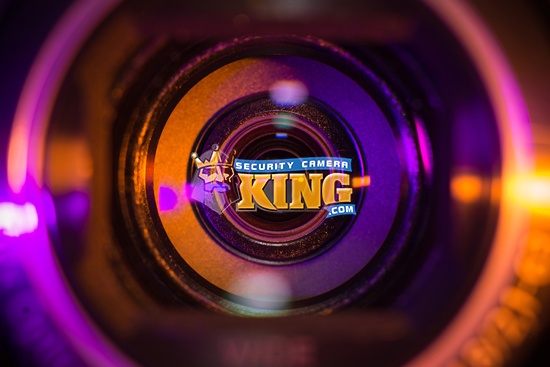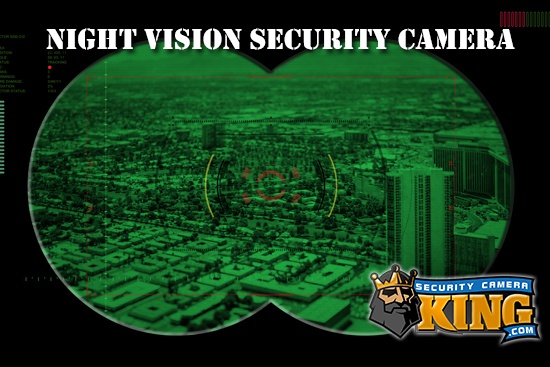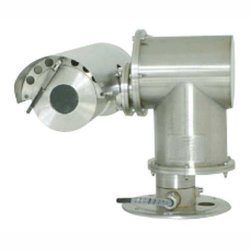 Many people find night vision security cameras to be the answer to their home and business needs. If you are considering a purchase of a night vision security camera there are several factors to keep in mind.
Many people find night vision security cameras to be the answer to their home and business needs. If you are considering a purchase of a night vision security camera there are several factors to keep in mind.
Factor 1 Image Enhancement
Night vision security cameras work in two ways. The first is by image enhancement. The security camera collects very minuscular amounts of light that are present in the environment and amplifies them so that the viewer of security camera footage can see the image.
The night vision camera often will have an objective lens that focuses the available light on a negatively charged electrode known as a photocathode. This causes the light electrons to increase in speed. These light electrons then find their way through holes in a specially equipped microchannel plate where they bounce off the walls and multiply. These electrons have now become a cloud. The cloud then hits a phosphor screen making the phosphor glow. It is this glow that allows enough light to be produced that the image can be viewed. Night vision cameras using image enhancement will have a green image. Green is used because the human eye can differentiate more shades of green than any other color.
Cameras using this technology have some definite advantages and disadvantages that the buyer needs to be aware of. The first advantage is that these night vision cameras work very well in low-light situations. They also produce acceptable images during the daytime. The night vision camera with image enhancement can produce many frames per second. There is a reduced likelihood of damage to the imaging detector when it comes in contact with a bright light source.
These cameras also require a large amount of power. The night vision camera with an image enhancer must be kept at a stable temperature which causes this energy consumption. Viewers will also see bright spots on the images when the light is too strong compared to the overall darkness. These bright spots, known as blooming, can be caused by street lights or lights in a building.
Factor 2 Thermal Imaging
Night vision security cameras can also depend on thermal imaging. These cameras contain a special lens that focuses the infrared light given off by all objects. The light is then scanned by elements that can detect the infrared light. Quickly a thermogram is produced that gives a very detailed temperature image from several thousand points within the field of view of the night vision security camera lens. From the thermogram electric impulses are then created and sent to a processing unit which translates the information into data which is then displayed.
Factor 3 Night Vision Gain
Night vision cameras work only when there is some available light. As there becomes less available light, night vision cameras offer a fuzzy image at best. It is important when purchasing a new night vision camera to consider the systems gain. The gain is the amount of time the camera amplifies the available light. It is measured as light output divided by light input. The result is the light that the viewer actually sees. Some manufacturers will try to mislead the public talking about tube gain. When comparing security systems, make sure to compare system gain not tube gain. System gain will not always increase clarity. It will also not always increase range of view. More gain is required to view objects that are further away. A great way to do this is with a high-speed lens. These lenses require less magnification. Therefore, they are able to use captured light more effectively.
Factor 4 Range
Four elements determine the range of a night vision camera. The first element is the night vision security system’s ability to magnify an image. The second element is the night vision security system’s resolution. The third element is the amount of light that is available. The final element is the amount of gain that is built into the system. As a general rule, most users will be extremely happy with a camera that shows objects at actual size. At the top end, for clarity, do not buy a product that offers more than three times magnification.
Factor 5 Wireless or Wired
Buyers of night vision security systems have two choices when it comes to powering the unit. They can be wired or wireless. Each has its own advantages and disadvantages.
The advantage of a wired camera is that once the system is in place they are basically maintenance free. However, it may be necessary to hire a professional to do the initial wiring. A wired security camera is usually cheaper to buy. The difference often offsets the difference in having it professionally installed.
A wireless system is easier to install. Often, it is only necessary to plug it in and connect it to your network. These systems are powered by batteries that must be routinely based. The newest trend in batteries for night vision security cameras is cameras that use solar powered batteries. These wireless systems can be easily moved from one location to another.
Night vision security cameras come in four different styles. Each has their own set of advantages.
The most popular night vision camera is the box style. These cameras can be used inside or outside when placed in a special protective housing. They are the largest night vision security camera. Some people find that the presence of a night vision camera is great for deterring criminals, just by its site. The lenses in these cameras can be exchanged.
The second most popular night vision camera is the dome camera. These are usually attached directly to an overhead surface. The main disadvantage to a dome camera is that they see only what is directly under the camera. The image is a 360 degree circle which can be hard to interpret for the new viewer. The lenses in these cameras can be exchanged.
The third most popular night vision camera is the bullet camera. These cameras are small and can be easily hidden. They can be used inside or outside with special housing. It is difficult to change the lenses in these cameras.
Night vision point/tilt and zoom cameras are also very popular. These cameras can be remotely controlled. While point/tilt and zoom cameras are extremely popular in other formats they are not as popular as night vision cameras.
Factor 7 IP or Analog Camera
Analog night vision security cameras are cheaper than IP security cameras. Buyers will find that they have a larger number of choices when looking at analog cameras. Most night vision analog cameras work together regardless of the make or model making it easy to upgrade your system at a later day.
On the other hand, IP cameras offer better wireless reception. These cameras provide a more secure encryption network. They also rely on existing network wiring within your home. These cameras have two drawbacks. The first is that they are usually more expensive than a comparable analog camera. These cameras also generally require a higher bandwidth than analog security cameras. If you want to be able to view your night vision security camera from a remote location, then you will need an IP camera so that the images can be viewed over the Internet.
Factor 8 Always On, Motion Detected, Viewer Choice
Night vision security cameras come in three choices. It is important to consider the choice before you make your purchase.
The first choice in a night vision camera is a camera that is always recording. These night vision cameras are usually associated with a day camera. As more light becomes available the camera switches to a day camera with full color images.
The second choice in a night vision camera is a camera that turns itself on when it detects motion. These cameras are great when there is not a lot of activity in a given area. Depending on the camera, it can even send a message to your email or your mobile phone.
The third choice allows the viewer to activate the camera whenever they want too. This allows the viewer to monitor situations they are concerned about. This saves on energy.
Is A Night Vision Camera Right For You?
Only you can answer if a night vision camera is the right choice for your situation. Remember that you need to protect your property. Another popular choice is an infrared security camera that requires no light.
Make sure to consider all your options. Know how you want to use your camera and then consider how those choices will impact the right camera for your individual circumstances. Do not delay in contacting a professional installer who can walk your property with you and make their recommendations. These professionals will have concrete information based on your individual circumstances. For instance, many properties will be best protected by a combination of several different camera types.
Do not delay! The property crime rate continues to grow daily in most areas of the country. Visit www.securitycameraking.com to see our full stock of night vision cameras.

